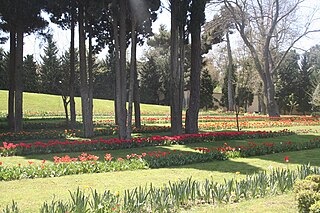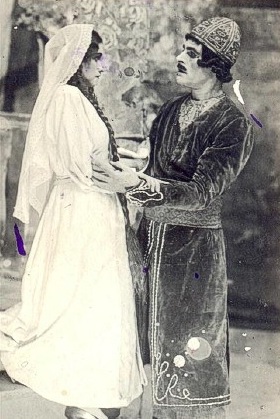
Uzeyir bey Abdulhuseyn bey oghlu Hajibeyov was an Azerbaijani composer, musicologist and teacher. He is recognized as the father of Azerbaijani classical music.

Abdulmuslim Muhammad oghlu Magomayev, commonly known as Muslim Magomayev, was an Azerbaijani composer and conductor. He is the grandfather and namesake of Azerbaijani opera singer Muslim Magomayev.

Hagigat Ali qizi Rzayeva was a Soviet Azerbaijani actress and singer of folk, opera, and pop music.

Huseyngulu Sarabski, born Hüseynqulu Malik oğlu Rzayev, was an Azerbaijani opera singer (tenor), composer, playwright, stage actor, theatre director, and musician (tar).

Ahmed Agdamski also known by the stage name of Ahmed Bashir oglu Badalbeyli who was a Soviet Azerbaijani opera singer, mugam singer and actor.

The Alley of Honor is a public cemetery and memorial in Baku, Azerbaijan. The Alley includes burials of famed Azerbaijanis and Azerbaijan-affiliated expatriates, including several Presidents, scientists and artists. There are over 280 burials in total.

Rustam Mammad oghlu Mustafayev was a painter, one of the creators of realist scenography in Azerbaijan.

Shah Abbas and Khurshid Banu – is the fourth mugham opera of Azerbaijani composer Uzeyir Hajibeyov in four acts and six scenes. A libretto also belongs to Uzeyir Hajibeyov. The opera was written basing on the motifs of Azerbaijani folk legend. The opera finishes with happy end, heroine – is a modest girl, daughter of a woodcutter who gains victory over psychology of a formidable Shah, who learns a handicraft – carpet weaving – because of his love to her.

Rustam and Zohrab is the third mugham opera by Uzeyir Hajibeyov. It was composed in 1910 based on the story of Rostam and Sohrab of the epic poem Shahnameh by Ferdowsi, and written in Persian.

Husband and Wife is a musical comedy in three acts with music and libretto written by Azerbaijani composer Uzeyir Hajibeyov, and an early example of the genre in Azerbaijan. It is the first of Hajibeyov's trilogy of three musical comedies, which also includes If Not That One, Then This One and Arshin mal alan.

Asli and Karam is the fifth mugham opera in four acts and six scenes written by Uzeyir Hajibeyov. Its libretto was written by the composer based on motifs of broadly famed in the South Caucasus poem Kerem and Aslı. The invincible power of love and spiritual beauty of man is glorified and feudal relations and nationalistic tendencies propagandized by clerical circles are attacked.

“Shah Ismayil” – is an Azerbaijani mugham opera in 6 acts and 7 scenes composed by Muslim Magomayev, in 1915-1919. Libretto and text were written by Mirza Gadir Ismayilzade basing on a legend about young Shah Ismayil.

Opera in Azerbaijan has a history dating back to the 19th century Russian Empire.

Ashig Garib – is the first opera written by Azerbaijani composer Zulfugar Hajibeyov, in 1916, based on motifs of a dastan of the same name. The opera was staged in Baku, in the theater of Haji Zeynalabdin Taghiyev, for the first time.

Azerbaijani classical music includes a range of musical styles rooted in the traditions of Western or European classical music that European settlers brought to the country from the 20th century and onwards.

Fakhraddin Gahraman oglu Atayev is an Azerbaijani conductor.
Aliovsat Shirali oghlu Sadigov was an Azerbaijani opera singer, People's Artist of the Azerbaijan SSR.

Sheikh Sanan is the second opera in five acts of the Azerbaijani composer Uzeyir Hajibeyov. He wrote the libretto based on the folk tale "Sheikh San'Aan". The opera tells about the tragic love of Sheikh Sanan and the Georgian girl, Khumar. The opera's essential motive was the protest against the cruel religious canons that prevented the love between the representatives of two nationalities of different faiths.
Zulfugar Huseyn oghlu Sariyev was an Azerbaijani opera singer, mugham performer, Honored Artist of the Azerbaijan SSR (1940).

Mammadtaghi Abbas oghlu Baghirov was an Azerbaijani-Soviet opera baritone, soloist of the Azerbaijan State Opera and Ballet Theater, and People's Artiste of the Azerbaijan SSR (1938).

















